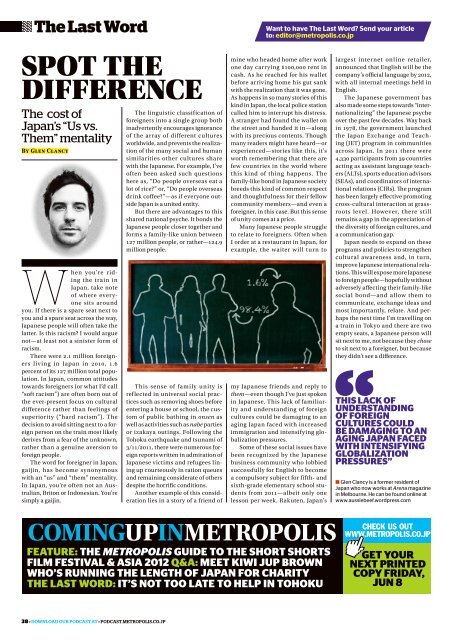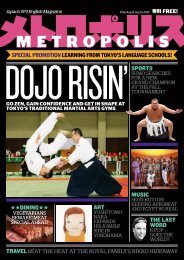GEt youR caFFEinE Fix in thE city - Metropolis
GEt youR caFFEinE Fix in thE city - Metropolis
GEt youR caFFEinE Fix in thE city - Metropolis
You also want an ePaper? Increase the reach of your titles
YUMPU automatically turns print PDFs into web optimized ePapers that Google loves.
The Last Word<br />
Spot the<br />
Difference<br />
The cost of<br />
Japan’s “Us vs.<br />
Them” mentality<br />
By glen Clancy<br />
When you’re rid<strong>in</strong>g<br />
the tra<strong>in</strong> <strong>in</strong><br />
Japan, take note<br />
of where everyone<br />
sits around<br />
you. If there is a spare seat next to<br />
you and a spare seat across the way,<br />
Japanese people will often take the<br />
latter. Is this racism? I would argue<br />
not—at least not a s<strong>in</strong>ister form of<br />
racism.<br />
There were 2.1 million foreigners<br />
liv <strong>in</strong>g <strong>in</strong> Japan <strong>in</strong> 2010, 1.6<br />
percent of its 127 million total population.<br />
In Japan, common attitudes<br />
towards foreigners (or what I’d call<br />
“soft racism”) are often born out of<br />
the ever-present focus on cultural<br />
difference rather than feel<strong>in</strong>gs of<br />
superiorit y (“hard racism”). The<br />
decision to avoid sitt<strong>in</strong>g next to a foreign<br />
person on the tra<strong>in</strong> most likely<br />
derives from a fear of the unknown,<br />
rather than a genu<strong>in</strong>e aversion to<br />
foreign people.<br />
The word for foreigner <strong>in</strong> Japan,<br />
gaij<strong>in</strong>, has become synonymous<br />
with an “us” and “them” mentality.<br />
In Japan, you’re often not an Australian,<br />
Briton or Indonesian. You’re<br />
simply a gaij<strong>in</strong>.<br />
Com<strong>in</strong>gup<strong>in</strong>mETRopoLiS<br />
FEATURE: ThE <strong>Metropolis</strong> gUidE To ThE ShoRT ShoRTS<br />
Film FESTivAl & ASiA 2012 Q&A: mEET kiwi JUp BRown<br />
who’S RUnn<strong>in</strong>g ThE lEngTh oF JApAn FoR chARiTy<br />
ThE lAST woRd: iT’S noT Too lATE To hElp <strong>in</strong> TohokU<br />
38 • download our podcast at • podcast.metropolis.co.jp<br />
The l<strong>in</strong>guistic classification of<br />
foreigners <strong>in</strong>to a s<strong>in</strong>gle group both<br />
<strong>in</strong>advertently encourages ignorance<br />
of the array of different cultures<br />
worldwide, and prevents the realization<br />
of the many social and human<br />
similarities other cultures share<br />
with the Japanese. For example, I’ve<br />
often been asked such questions<br />
here as, “Do people overseas eat a<br />
lot of rice?” or, “Do people overseas<br />
dr<strong>in</strong>k coffee?”—as if everyone outside<br />
Japan is a united entity.<br />
But there are advantages to this<br />
shared national psyche. It bonds the<br />
Japanese people closer together and<br />
forms a family-like union between<br />
127 million people, or rather—124.9<br />
million people.<br />
This sense of family unit y is<br />
reflected <strong>in</strong> universal social practices<br />
such as remov<strong>in</strong>g shoes before<br />
enter<strong>in</strong>g a house or school, the custom<br />
of public bath<strong>in</strong>g <strong>in</strong> onsen as<br />
well as activities such as nabe parties<br />
or izakaya out<strong>in</strong>gs. Follow<strong>in</strong>g the<br />
Tohoku earthquake and tsunami of<br />
3/11/2011, there were numerous foreign<br />
reports written <strong>in</strong> admiration of<br />
Japanese victims and refugees l<strong>in</strong><strong>in</strong>g<br />
up courteously <strong>in</strong> ration queues<br />
and rema<strong>in</strong><strong>in</strong>g considerate of others<br />
despite the horrific conditions.<br />
Another example of this consideration<br />
lies <strong>in</strong> a story of a friend of<br />
Want to have The Last Word? Send your article<br />
to: editor@metropolis.co.jp<br />
m<strong>in</strong>e who headed home after work<br />
one day carry<strong>in</strong>g ¥100,000 rent <strong>in</strong><br />
cash. As he reached for his wallet<br />
before arriv<strong>in</strong>g home his gut sank<br />
with the realization that it was gone.<br />
As happens <strong>in</strong> so many stories of this<br />
k<strong>in</strong>d <strong>in</strong> Japan, the local police station<br />
called him to <strong>in</strong>terrupt his distress.<br />
A stranger had found the wallet on<br />
the street and handed it <strong>in</strong>—along<br />
with its precious contents. Though<br />
many readers might have heard—or<br />
experienced—stories like this, it’s<br />
worth remember<strong>in</strong>g that there are<br />
few countries <strong>in</strong> the world where<br />
this k <strong>in</strong>d of th<strong>in</strong>g happens. The<br />
family-like bond <strong>in</strong> Japanese society<br />
breeds this k<strong>in</strong>d of common respect<br />
and thoughtfulness for their fellow<br />
community members—and even a<br />
foreigner, <strong>in</strong> this case. But this sense<br />
of unity comes at a price.<br />
Many Japanese people struggle<br />
to relate to foreigners. Often when<br />
I order at a restaurant <strong>in</strong> Japan, for<br />
example, the waiter will turn to<br />
my Japanese friends and reply to<br />
them—even though I’ve just spoken<br />
<strong>in</strong> Japanese. This lack of familiarity<br />
and understand<strong>in</strong>g of foreign<br />
cultures could be damag<strong>in</strong>g to an<br />
ag<strong>in</strong>g Japan faced with <strong>in</strong>creased<br />
immigration and <strong>in</strong>tensify<strong>in</strong>g globalization<br />
pressures.<br />
Some of these social issues have<br />
been recognized by the Japanese<br />
bus<strong>in</strong>ess community who lobbied<br />
successfully for English to become<br />
a compulsory subject for fifth- and<br />
sixth-grade elementary school students<br />
from 2011—albeit only one<br />
lesson per week. Rakuten, Japan’s<br />
largest <strong>in</strong>ternet onl<strong>in</strong>e retailer,<br />
announced that English will be the<br />
company’s official language by 2012,<br />
with all <strong>in</strong>ternal meet<strong>in</strong>gs held <strong>in</strong><br />
English.<br />
The Japanese government has<br />
also made some steps towards “<strong>in</strong>ternationaliz<strong>in</strong>g”<br />
the Japanese psyche<br />
over the past few decades. Way back<br />
<strong>in</strong> 1978, the government launched<br />
the Japan Exchange and Teach<strong>in</strong>g<br />
(JET) program <strong>in</strong> communities<br />
across Japan. In 2011 there were<br />
4,330 participants from 39 countries<br />
act<strong>in</strong>g as assistant language teachers<br />
(ALTs), sports education advisors<br />
(SEAs), and coord<strong>in</strong>ators of <strong>in</strong>ternational<br />
relations (CIRs). The program<br />
has been largely effective promot<strong>in</strong>g<br />
cross-cultural <strong>in</strong>teraction at grassroots<br />
level. However, there still<br />
rema<strong>in</strong>s a gap <strong>in</strong> the appreciation of<br />
the diversity of foreign cultures, and<br />
a communication gap.<br />
Japan needs to expand on these<br />
programs and policies to strengthen<br />
cultural awareness and, <strong>in</strong> turn,<br />
improve Japanese <strong>in</strong>ternational relations.<br />
This will expose more Japanese<br />
to foreign people—hopefully without<br />
adversely affect<strong>in</strong>g their family-like<br />
social bond—and allow them to<br />
communicate, exchange ideas and<br />
most importantly, relate. And perhaps<br />
the next time I’m travell<strong>in</strong>g on<br />
a tra<strong>in</strong> <strong>in</strong> Tokyo and there are two<br />
empty seats, a Japanese person will<br />
sit next to me, not because they chose<br />
to sit next to a foreigner, but because<br />
they didn’t see a difference.<br />
ThiS lAck oF<br />
UndERSTAnd<strong>in</strong>g<br />
oF FoREign<br />
cUlTURES coUld<br />
BE dAmAg<strong>in</strong>g To An<br />
Ag<strong>in</strong>g JApAn FAcEd<br />
wiTh <strong>in</strong>TEnSiFy<strong>in</strong>g<br />
gloBAlizATion<br />
pRESSURES”<br />
■ Glen Clancy is a former resident of<br />
Japan who now works at Arena magaz<strong>in</strong>e<br />
<strong>in</strong> Melbourne. He can be found onl<strong>in</strong>e at<br />
www.aussiebeef.wordpress.com<br />
check us out<br />
www.metropolis.co.jp<br />
gET yoUR<br />
nExT pR<strong>in</strong>TEd<br />
copy FRidAy,<br />
JUn 8












